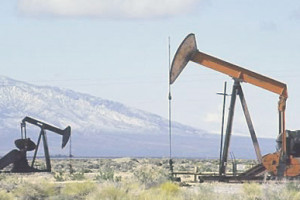Putin Aide Who Called Shock Rate Cut Sees Pause as Oil Nears $40

(Bloomberg – bloomberg.com – Olga Tanas, Evgenia Pismennaya – August 18, 2015)
Andrey Belousov went largely unheeded the last time he forecast a shift in monetary policy. Now President Vladimir Putin’s top economic aide is lending weight to a growing consensus that Russia’s easing cycle is wearing out.
The central bank may pause its interest-rate cuts after five decreases this year if oil prices fall to $40 a barrel, Belousov said in an interview on Tuesday. Traders have started to predict a rate increase, with forward-rate agreements signaling borrowing costs will rise by 18 basis points in the next three months, according to data compiled by Bloomberg.
“Given that we have no other comments from the central bank, Belousov’s statements should be taken seriously”
“If the situation on the foreign-exchange market changes as a result of a significant drop in oil prices — to $40 a barrel, with fluctuations between $40 and $45 — then the central bank will probably halt the process of cutting the rate,” Belousov said by phone.
Oil’s decline of more than 30 percent since June is rippling through the recession-hit economy of the world’s biggest energy exporter, forcing policy adjustments as the ruble trades at a six-month low. The central bank, led by Governor Elvira Nabiullina, has lowered its benchmark by a cumulative six percentage points to 11 percent this year after an emergency increase in December.
Belousov, a former economy minister who replaced Nabiullina as Putin’s aide after she took charge of the central bank in 2013, was among the first officials to broach the possibility of a rate cut in January. Days later, the Bank of Russia shocked traders and analysts alike with a decrease that was among the most abrupt policy reversals by major central banks since 1990.
‘Taken Seriously’
“Given that we have no other comments from the central bank, Belousov’s statements should be taken seriously,” Alexey Pogorelov, an economist at Credit Suisse Group AG, said by e-mail.
The ruble is moving into the forefront of policy concerns after the world’s worst performance in the past three months with a 25 percent drop against the dollar. It weakened 0.5 percent to 65.84 against the U.S. currency in Moscow on Tuesday.
Brent crude, used to price Russia’s main export blend Urals, slipped 12 cents to $48.62 a barrel on the London-based ICE Futures Europe exchange.
The slump in oil, which has traded in a bear market since last month, is straining Russia’s budget, threatening to reignite inflation and further destabilize the ruble. Crude, along with gas, accounts for about half of the country’s budget revenue.
‘Utmost Attention’
The government is giving its “utmost attention” to the ruble’s exchange rate and monitoring the situation almost daily, Putin said on Tuesday in Sevastopol.
Not everyone in the government is resigned to a pause at the central bank’s next policy meeting on Sept. 11.
The Economy Ministry, for one, still sees “significant” potential for further monetary easing because real rates remain high when measured against expected inflation of 7 percent in 12 months, according to its e-mailed response to questions.
The Bank of Russia didn’t respond to a request for comment.
The economy, which contracted for two quarters on an annual basis, will shrink through 2017 if oil remains at $40, the central bank said in June. Policy makers have said they may worsen their forecast for a 3.2 percent slump this year.
Only Tool
The key rate is the only instrument at the central bank’s disposal to affect the ruble, Belousov said on Monday, according to state-run news service RIA Novosti. That’s because Russia can’t afford to conduct interventions on the currency market given the current level of its reserves as well as the central bank’s free-float policy, he said.
The Bank of Russia shifted to a free-floating exchange rate ahead of schedule in November and last month halted its foreign-currency purchases to replenish reserves. It spent about $88 billion propping up the ruble last year amid a slump in oil prices and capital outflows stoked by sanctions imposed over the conflict in Ukraine.
“I’m not inclined to believe that Belousov sets the direction for the central bank’s decisions,” said Vladimir Tikhomirov, chief economist at BCS Financial Group in Moscow. “His words reflect reality.”
Article ©2015 Bloomberg L.P. All Rights Reserved. Article also appeared at bloomberg.com/news/articles/2015-08-18/russia-may-halt-monetary-easing-if-oil-at-40-kremlin-aide-says
